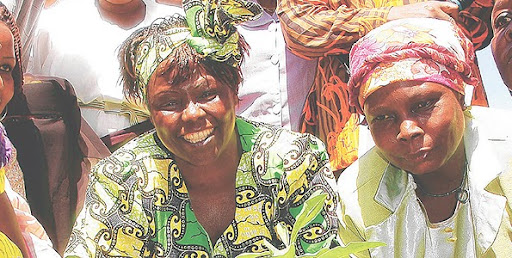News
Make peace with Mother Earth to stave off drought and famine
By Tom Odihambo

File | NATION Prof Wangari Maathai during a past tree-planting exercise. She has released a new book, Replenishing the Earth, on the environment.
The cliché that Kenyans have learnt nothing from history other than that they have learnt nothing rings true today.
One reason for the cliché’s popularity is the shenanigans in politics. But the other reason is the current spell of drought which has caused starvation and deaths in many parts of the country.
The media seem keen to dissect how people in the “arid and far north” parts of Kenya are faring. Arid and far north Kenya, did you say? Three quarters of Kenya is actually arid. Avoidable famine? Famine should not be spoken of in independent, agricultural, 21st century Kenya.
It seems that the media suffer from annual rounds of amnesia. Reports similar to the ones in the news today were around two years ago. Shouldn’t the media highlight the fact that the problem really is severe environmental degradation and the government’s inaction to arrest it?
The famines that we only associate with Pokot, Turkana, Somali, Kamba, Marakwet or Tugen will soon envelop all of us unless we listen to the words of Wangari Maathai’s new book, Replenishing the Earth: Spiritual Values for Healing Ourselves and the World (Doubleday, 2010).
To speak about Wangari Maathai in Kenya is to speak about the Green Belt Movement (GBM) and environmental conservation. She is the most known environmental conservation activist in Kenya and Africa. Her words get the attention of the who-is-who in global business, politics or funding circles.
Without her, we wouldn’t be seeing or relaxing at Uhuru Park. She was Moi regime’s nightmare – opposing all kinds of attempts to excise government land such as Karura and Ngong forests. Maathai has walked the talk, like the evangelist of the gone days.
But we Kenyans – and most of the world – are unconverted. This is why Maathai’s latest book is interesting. It seeks to appeal to its readers by highlighting the spiritual ties that humanity has with the environment.
Isn’t it surprising that when the rains fail we seek God’s intervention; when crops wither in some communities, the elders sacrifice to the ancestors; in other communities drought and famine are blamed on serious moral deficit.
What these actions suggest is that mankind is inextricably linked to nature. From earth we come and to earth we return is not just a sad refrain at burials, it is a reality.
In Replenishing the Earth, Maathai calls on humanity to respect nature, treat her with dignity, give back as much as we take away, be grateful for what she has given us, heal the wounds we have inflicted on her, strive to know ourselves as ways of suing for peace and life.
But is this a message that still needs to be repeated? Not really. The signs are all around us. Rivers are dry or dead. Former forests are now farmlands.
Some crop and animal species have disappeared. Flooding is a natural consequence of any long rains. Bush fires are a common sight.
Slums may not be immediately linked to environmental degradation but they are. It is the countryside poor, whose farms have exhausted their fertility, the pastoralists who have lost their cattle, the fishermen who have no rivers and lakes to fish from, the millions of hapless, hungry and unemployed who are filling the shanty towns.
They or their ancestors cut trees to clear land for farming, planted the same crops for years without replenishing the land. Now nature is chasing them away by refusing to produce water and food.
For the rest of the society, overconsumption and the unbridled want for furniture, minerals, oil, exotic plants and animals, bigger concrete houses, holidays on beaches, game reserves and mountains are leading to massive destruction of fragile ecosystems.
What is the ecological cost? We don’t know yet, as Maathai reminds us. We won’t know soon. But we can see the writing on the wall. And in Replenishing the Earth Maathai warns that it is payback time, but also a time to truly reconnect with nature as a way of reclaiming our own humanity.
This is a book that should convince even the extreme global warming naysayers, environmental conservation cynics or the common man and woman who casually throws anywhere the plastic wrapping for food.
The writer teaches literature at the University of Nairobi.
Article from the Daily Nation
